 By Staff
By Staff
January 30th, 2024
BURLINGTON, ON
The Ontario Legislative Standing Committee on Heritage, Infrastructure and Cultural Policy heard from two of Burlington’s city councillors and the Mayor.
The Standing Committee was visiting Ontario’s eight regional municipalities: Halton, York, Durham, Waterloo, Niagara, Peel, Muskoka District, and Oxford County and their lower-tier municipalities for their views on the provincial governments review.
Paul Sharman has this to say:
It’s a pleasure to be here. My name is Paul Sharman. I’m a ward 5 councillor for the city of Burlington in the region of Halton. I am also the deputy mayor of strategy, budget, process and performance, and president of Halton Community Housing Corp.
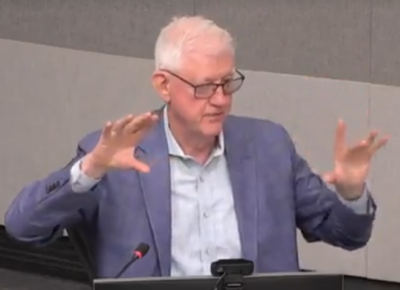
Councillor Paul Sharman: I reorganize corporations.
I’ll just take, very quickly, a few seconds to describe why I’m here and the perspective that I will offer you. I have been an elected official for 13 years now. I’ve won four elections. But I’m an accountant; I’m a management accountant. I’ve operated as a controller at Nortel and other companies but, more importantly, I ran a consulting firm—and still do—for 30 years.
What I do is reorganize corporations, including some very large corporations. The Canadian government has been a client of mine. I’ve reorganized companies like US West, Kellogg and many corporations like that. My perspective in what I’m about to say is that of a consultant, somebody who reorganizes corporations. I’ve spent many years focusing on downsizing, many years on process redesign, and many years on economic analysis and activity analysis and performance measurement.
I take none of this discussion lightly.
I’ll start off by saying that I have some general organization performance observations of all levels of government, but whatever I’m saying here especially relates to the building of new homes and the required future amenities and infrastructure, because it’s not just about housing. We cannot just have rows and rows of houses like chicken coops. It’s not the right answer. We have to make sure we think holistically about the needs of the community.
Burlington is one of the few communities in Canada, or, in fact, North America, as a result of the work we’ve done, that has a 25-year strategic planning horizon for the community. It’s not about getting elected officials re-elected. We need to change our thought processes to think about the future of our communities.
That said, what I can tell you is the following quite quick statements:
The first thing is all levels of government function in a highly siloed fashion—barriers around everything. There is much fragmentation of work within those silos. People drop work; they get redirected. In our own planning department, we do these things called refilings, because anything we can find to trip up the applicant, to send it back and keep them waiting for another year, we do. We’ve got so much work, we’ve got so many bylaws, and we have such complexity at every level of government, it stops us from being effective.
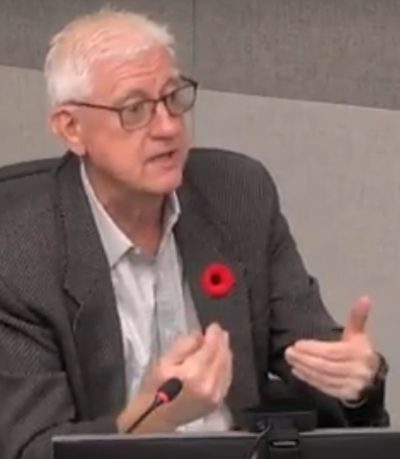
Councillor Sharman: “We have poorly designed processes.”
We have commenting agencies who are disconnected when dealing with our applications—45 of them. There is significant duplication of work between Halton and Burlington, for example. Why is that? Why don’t we actually plan our processes holistically from the province right the way through down to delivery of housing, instead of just having these disconnects which exist dramatically everywhere?
We have poorly designed processes—I don’t even think we have designed processes in government; they’ve evolved, just like they do everywhere. But unless you design them, they’re not going to work effectively.
We have inadequate focus on the future. We’re thinking about just the last five years or the next five years, but now we’re talking about millions of people coming in the next 30 years. When do we get our brains around redesigning government and all the infrastructure we need to make that happen? We’re not there. We haven’t done that.
We have lack of clarity around purpose. We don’t have clarity around performance expectations at every level. They’re not aligned. We don’t have a 30-year, 25-year strategy for Ontario. When are we going to do that? Because how do you expect anybody to deliver if we’re fuzzy and coming up with hare-brained schemes that we then reverse? It’s because we haven’t been sophisticated, we haven’t thought it through.
Inadequate understanding of roles and responsibilities relative to community at all levels, from strategy through process through services through activities and through KPIs—it’s not put together. How do we do it? How do we get anything done? How can we possibly expect to get speed in delivery of needed homes and services and infrastructure if we can’t even get our brains around how to make it go seamlessly from one level to the other and make it work? We don’t do that.
Finally, consequently, all the activities I see are hugely inefficient, hugely ineffective and very wasteful of taxpayers’ money. We can do better, and this is the room where I think you can influence it.
So, what works in the region? I can tell you. The first thing I’ll say is the employers at all levels of professions are impressive in many ways. I truly appreciate their professionalism, their patience and desire to be supportive of elected officials and regulations.
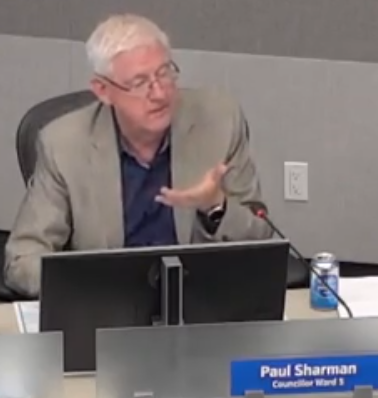
Councillor Sharman: “I don’t like being told what to do. “
Operations in the region of exclusively controlled spheres which are mostly controlled by the province seem pretty good. But, actually, I don’t like being told what to do, because we have to have carriage of the buildings that we’re going to do in Burlington, so we need to say to other regions what we’re going to deliver, what we want them to deliver to us, not the other way round. I’m being consistent with the mayor’s thought process.
What doesn’t work well is—well, I’m going to start off with a statement, and you can believe this or not. You can take it as you like.
My belief is as region decisions are made, the only democratically elected representatives of any lower-tier municipality are the councillors of that lower-tier municipality and the region chair. Other members do not represent the interests of any other lower-tier municipality other than their own. That causes difficulties around that region table that we don’t need, which is why I’m supportive of the notion—absolutely no amalgamation.
But, furthermore, I want to give carriage to the lower-tier for everything, because it gets in the way when we find regional people saying, “Well, we’re in charge. That’s the way it will be done.” For example, we’ve got this open sewer running through the middle of Burlington called the QEW – but we can’t get control of the access and egress of that road during peak hours when that sewer blocks up and it spews all into our city roads. We talked to the province, and what’s the answer? “Oh, well, you should just, you know, have no parking requirements with high-rise towers.”
I am a long way from finished with this conversation. I have more to say. It’s all in the materials I’ve left with you, and I’ll be more than happy to have a conversation with any and all of you at your wish. Thank you.
Sharman certainly wasn’t pulling his punches. The Legislative Committee was hearing what Burlington residents have heard for the past 12 years.
Once each of the three made their seven minute address they were asked questions by the members of the Standing Committee that was made up of MPP’s who were part of the government and MPP’s who were part of the NDP opposition.
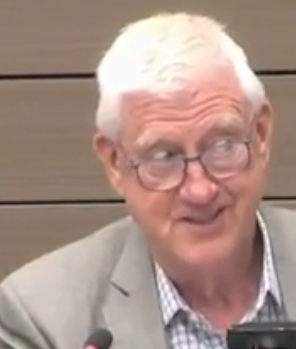
Standing Committee member Mary Margaret McMahon told Sharman: “…this has got to be the most energetic and frank comment. I appreciate your candour. Honestly, you just tell it like it is.” Expect to see these comments in Sharman’s campaign literature in 2026
Ms. Mary-Margaret McMahon MPP for Beaches in Toronto said: “I have to say that your panel has got to be the most energetic and frank. I appreciate your candour. Honestly, you just tell it like it is.”
Mme Dawn Gallagher Murphy had a specific question for Sharman. ” I noted in your comments you talked about the complexity of all levels of government. You talked specifically about duplication of work. As it pertains to building more homes, could you give me a specific example of where duplication of work comes in that is perhaps preventing Burlington from making sure more homes can get built?
Mr. Paul Sharman: Sure. As you will know, there are different groups or organizations involved with approving the applications: the region, Conservation Halton and the city of Burlington. What happens is, they all take their time, and they all have their own rules and their own bylaws and all the rest of it. We can just do it all at the city. The duplication is that we’re going through the same administration process of getting an application, trying to review it, looking at our rules and suggesting it could be done as a single stream within the city of Burlington.
Mme Dawn Gallagher Murphy: From a regional perspective, does that mean the region should not be involved in that—that you can do it yourself?
Mr. Paul Sharman: In my general view, the answer is that we should do as much as can be done at the lower level as possible.
The thing that may not be recognized here and that contributes to why we have very low starts in housing is because we’re built out; we have no greenfield.
The fact that the planning regime uses things called BPE, which is rear-view mirror looking, and it was never considered that we would actually be requiring to grow—it was only on November 8 that we found out we were going to have, actually, 70,000 more people. And then when the province—and we were very pleased—converted those lands to mixed use, 700 acres, it gave us the opportunity to have some growth and have a future. But the fact is, there is no analysis that deals with anything other than planning code and official plans. There is no consideration of the social benefits of development. There is no triple bottom line, and there is no win-win-win. So the fact of the matter is, we are not thinking holistically. We are not thinking about our future.
We need to be out there—30 years—looking at the mix of people coming here, because there’s going to be huge numbers of people from the subcontinent and from Asia, and they will not be used to the things that we wouldn’t have because we don’t have the land. We actually have to think about it now, because otherwise we’ll keep doing what we’re doing right now, in chunks of five years, and it will just be more of the same old, row after row after row. So we have to take action now.
Ms. Mary-Margaret McMahon, a Liberal member said she was “ going to start with Paul, the most frank person I’ve met yet—love it. You were talking about us not being forward-thinking and planning for the future, and I agree. I’m a big environmentalist; that’s why I got back in this nutty world, let’s say, and I’m very worried about the lack of climate action. We’ve been told by our Financial Accountability Officer about the high cost of inaction for building resilient infrastructure. If you could think of one thing for sure that is forward-thinking and acting now or yesterday, what would that be?
Mr. Paul Sharman: I’m a data freak, and I’d start off with the numbers. I hear a lot of ideological arguments about save the grass blade, save the world. I think that is uninformed. I also believe we need environment care.
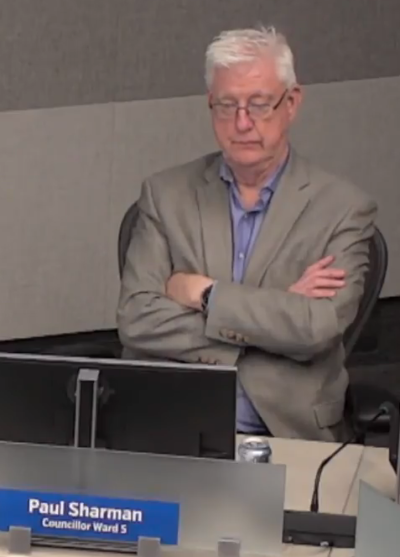
Councillor Sharman said: “It was never considered that we would actually be requiring to grow—it was only on November 8 that we found out we were going to have, actually, 70,000 more people.
I just think we’re not having balanced conversations about what the real situation is and what has to be accomplished. The aging community leaves us in a place where we can’t have babies enough to fill jobs. We can’t find housing because everybody is getting older and not dying. So we actually have to look out 30 years and ask ourselves who needs to be here, how we’re going to get them, how we’re going to look after the environment and what social benefits of development we’re going to provide, including all the infrastructure. And do some planning at the province level, please.
That was it. Burlington made its case. Mayor Meed Ward made it very clear that Burlington did not want to become part of what she feared was going to be the City of Halton.
She said: “This is the Burlington council position. We have unanimously endorsed a resolution that:
—we are open to consideration of all feasible governance options except amalgamation to a mega-city of Halton;
—governance changes should be supported by local-tier councils, based on community engagement, and should deliver better services quicker and faster; and
—needed community infrastructure is funded through development charges or senior levels of government.
“Local government is the closest to the people. We understand the needs of our community. We do not need an imposed solution from any other level of government. Our community really doesn’t care who’s delivering the services as long as they’re delivered well.
” We would like the province and the federal government to provide us with the funds we need to get the job of building new homes done.”
Burlington made the point that they could do much of the work the Region currently does, but realized is as well that there are tasks that have to be done on a Regional basis. Providing the drinking water and waste water management, or is as Mayor Meed Ward put it – Taps to toilets should be regional. Transit, which is now run by the municipalities could, and should be run Regionally. Roads, storm water management and, obviously, drainage.
The Standing Committee will complete its road trip and then debate and discuss what they want to present to the Legislature. This isn’t going to happen in a few months – it could be is as much as a ear before there is a report.
The last time the province looked at the municipal; structure NAMES toured the province, spent a day at the Region listening to what each municipality and prepared a report. That report was never made public.
The report the Standing Committee makes will be public and that is about all that can be said at this point.



















Why did the Mayor take Rory rather than Shawna who is the Deputy Mayor of Housing? Nevermind, it’s obvious as usual.
This whole thing was laughable. The photos the mayor posted of the giddy trio made the rounds and we literally laughed out loud …
If you understand what Sharman said let us all know.A lot of bafflegab imho.
Got ya covered.
Hello my name is (blank) I’ve been a councillor for (blank) years and before that I did (blank).
In Burlington we are always working on a plan, the current one is 25-years but it could be 30, 50 or 100 years it really doesn’t matter much anyway because we are always altering it to reflect reality.
The taxpayers in Burlington have been telling us for years about waste, duplication and a bureaucracy that is out of control and should be halved, even more so for our 2024 budget.
Naturally this is a much to simplistic view, so for the next hour I will do my best to complicate it,
If you find yourself still unconfused I have had staff compile an even more complicated printed hand out with nonsensical graphs. After this presentation I will be happy to take any questions, but please keep them within the spirit of the presentation and make them completely unrelated to any concerns that the voters feel they have.
Buzz Words and Acronyms to look up before reading. Carriage-Holistically-Siloed-KPI’s-
Now that is well-explained David. Now I get it! Thank You!
Gary, not sure how old you are, I sincerely hope you are enjoying the experience of living in Burlington (voted one of the best places to live in Canada) and are hoping to continue in your enjoyment and feelings of being valued for contributions to the results of Burlingtons success.
These other short snippets from the presentation might enhance your feelings of belonging.
Presentation Snippets:-“The thing that may not be recognized here and that contributes to why we have very low starts in housing is because we’re built out; we have no greenfield.
The aging community leaves us in a place where we can’t have babies enough to fill jobs. We can’t find housing because everybody is getting older and not dying
So we actually have to look out 30 years and ask ourselves who needs to be here”
Not sure about you Gary but I’m certainly feeling the love.
Sharman, Nisan and Meed Ward failed to obtain their constituents position as we requested well before the hearing. We made the point to the hearing that it was their personal position. The best representative position from our perspective came from a resident of Burlington who is also a Municipal employee, not Burlington who spoke alongside Carr and Burton. Perhaps you can post the public transcript links so those who are interested can hear what they all had to say on such an important issue.